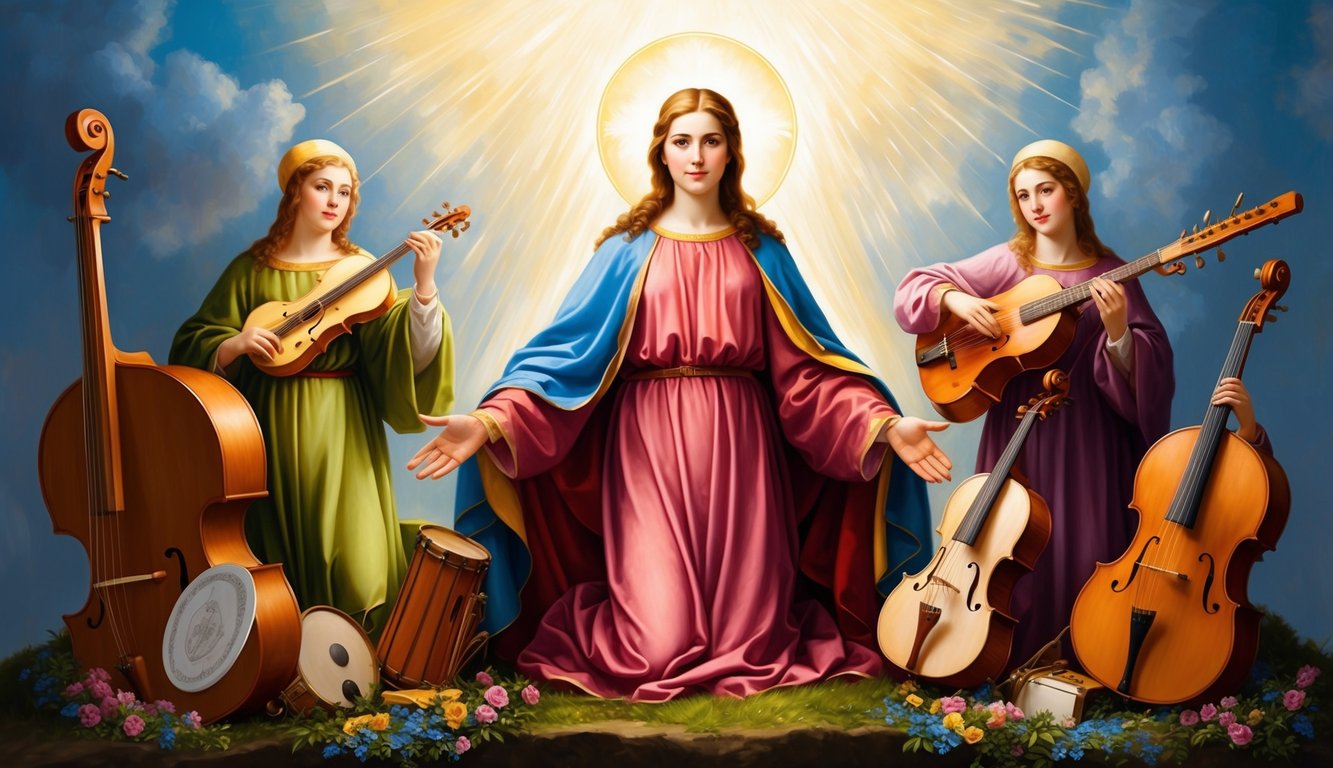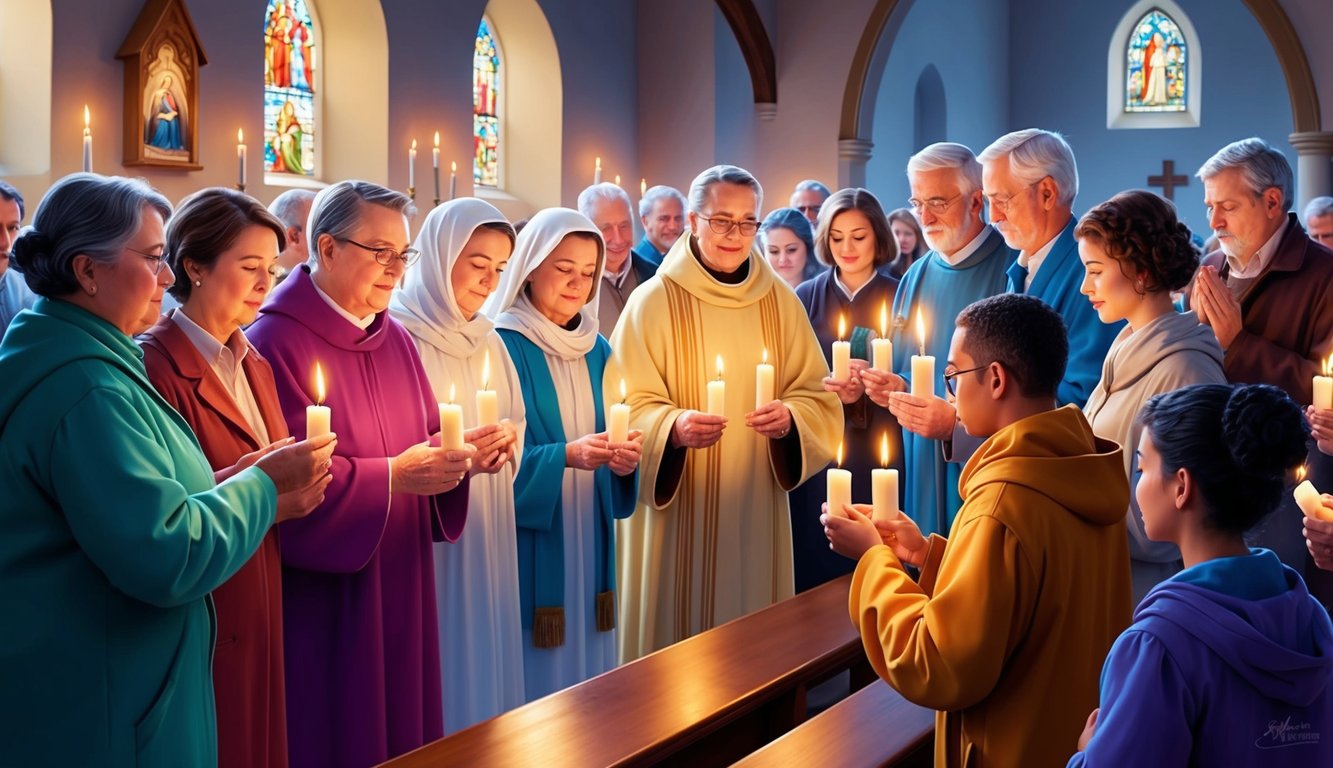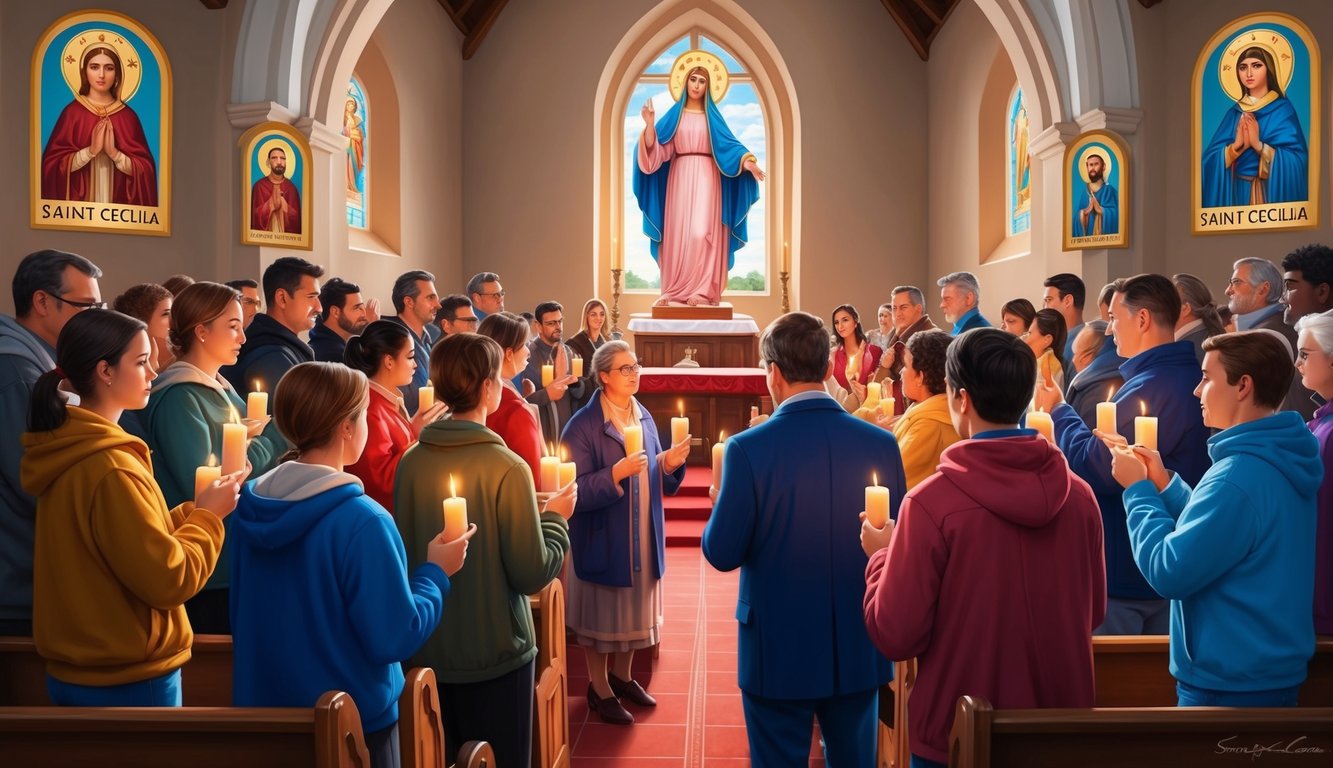Don’t Miss Out On This Unique Astrological Opportunity
Are you tired of spinning your wheels and getting nowhere? Simply put, you’re out of sync: you’re out of alignment with your astral configuration.
But: there’s a kind of map that can help you reclaim your alignment. Think of it as your own personal blueprint to success and happiness: a blueprint that will help you live your most amazing life.
Get started here.
The Novena to Saint Cecilia is a spiritual journey that invites you to connect with the legacy of a revered saint.
Saint Cecilia, known as the patron saint of musicians, inspires many through her unwavering faith and dedication. By engaging in the novena, you can seek her intercession for a variety of needs, particularly those related to music, art, and faith.
If you’re searching for guidance or hoping to enrich your spiritual life, the novena to Saint Cecilia offers a meaningful path.
Each day of prayer embodies the virtues and strength that Saint Cecilia demonstrated throughout her life.
With her as your guide, you’ll find solace and inspiration as you navigate your own challenges.
Understanding the steps involved in praying this novena can enhance your experience.
Whether participating individually or with a community, the novena offers a structured opportunity for reflection and prayer.
Embrace this time as a chance to deepen your faith and cultivate a closer relationship with a beloved saint.
Key Takeaways
- Engage in meaningful prayer with the novena to Saint Cecilia.
- Strengthen your faith by following the structured daily prayers.
- Experience spiritual enrichment inspired by Saint Cecilia’s legacy.
The Life and Martyrdom of St. Cecilia

St. Cecilia is remembered for her steadfast faith and commitment to Christianity.
Her life was marked by her early conversion, her influence on her husband Valerian, and her ultimate martyrdom for her beliefs.
Her story highlights her virtues of innocence and holiness.
Early Life and Baptism
St. Cecilia was believed to have lived during the second or third century in Rome.
She was born into a wealthy family and raised with strong Christian beliefs.
From a young age, she dedicated herself to God and took a vow of virginity.
Her baptism greatly influenced her spiritual journey, reinforcing her devotion to her faith.
Cecilia’s commitment to her religion set her apart, underscoring her unwavering principles.
Her early life demonstrated her innocence and the beginning of her journey toward sainthood.
Marriage to Valerian and Conversion
Cecilia was married to a Roman nobleman named Valerian.
Despite her vow of virginity, she was forced into marriage due to societal pressures.
On their wedding night, Cecilia revealed her vow to Valerian and told him of her guardian angel protecting her.
Valerian respected Cecilia’s faith and agreed to convert to Christianity himself.
He was baptized by Pope Urban, becoming a devoted Christian.
This significant event added depth to their relationship, showcasing both Cecilia’s influence and Valerian’s willingness to embrace Christianity.
Their marriage was a testament to their shared faith and Cecilia’s ability to guide others toward religious devotion.
Martyrdom and Virtues
St. Cecilia’s commitment to her faith ultimately led to her martyrdom.
Christians faced persecution during her time, and Cecilia’s open practice of Christianity made her a target.
Despite facing execution, she remained steadfast in her devotion.
Cecilia is said to have survived several attempts on her life, including being struck by a sword.
Her body was later discovered incorrupt, further solidifying her status as a symbol of holiness and virtue.
Her martyrdom exemplified her sacrifice for her beliefs, showcasing her courage and unwavering faith.
This story continues to inspire believers worldwide.
Spiritual Significance of the Novena to St. Cecilia
The Novena to St. Cecilia invites you to explore deep aspects of faith, through her role as the patron saint of musicians and holy canticles.
This devotion is a journey of spiritual intercession, reflection, and appreciation of divine love and celestial harmonies.
Intercession and Divine Love
The Novena to St. Cecilia aims to strengthen your faith through the power of intercession.
You seek her assistance to connect with the divine, believing that her prayers hold special favor in heaven.
This intercession embodies divine love, as you trust St. Cecilia to convey your prayers to God.
Participating in this novena teaches you to rely on others’ support and embrace divine presence in your life.
By honoring St. Cecilia’s intercession, you also affirm the importance of community and collective prayer.
You learn that divine love is accessible through the shared experience of faith, which can bring comfort and guidance.
This aspect of the novena highlights the bond between saints and the faithful, nurturing a deeper relationship with the Holy Spirit.
Pure Faith and Reflection of Holy Canticles
The novena encourages you to reflect on the purity of faith embodied by St. Cecilia.
She is known for her unwavering devotion and her ability to transform music into praise.
During the novena, you meditate on these qualities to foster your own spiritual growth.
Engaging in this practice helps you appreciate the beauty of a faith-filled life.
You can seek inspiration from St. Cecilia’s example, letting the holy canticles guide your prayers and uplift your soul.
This reflection teaches you the importance of dedicating your talents to God and using your voice as a tool for evangelization.
Patroness of Music and Arts
As the patron saint of music and arts, St. Cecilia symbolizes the connection between creativity and spirituality.
The novena is an opportunity for you to honor her legacy by recognizing the spiritual dimension in artistic expression.
You acknowledge how music can be a vehicle for prayer and transcendence.
Musicians and artists find inspiration in St. Cecilia’s life, seeing her as a guide to using their gifts for a greater purpose.
By participating in the novena, you embrace the idea that music, as well as other forms of art, are sacred expressions of divine love.
Through this practice, you cultivate a deeper understanding of how creativity can unite you with the celestial realm.
Praying the Novena: A Step-by-Step Guide
Engaging in the novena to St. Cecilia allows you to deepen your faith and connect with a tradition rich in spiritual significance.
This guide will help you prepare your heart, follow the daily prayer structure, and engage in meaningful contemplation and invocation.
Preparing the Heart for Prayer
Before starting a novena, it is important to focus on your spiritual readiness.
Find a quiet space where you won’t be disturbed.
You may wish to light a candle as a symbol of divine presence in your prayers.
Spend a few moments in silence, centering your thoughts on your intentions and those you are praying for.
Reflect on the attributes of St. Cecilia, such as her unwavering faith and love of Jesus.
Consider how her life inspires your spiritual journey.
Invite your guardian angel to guide you through the novena, providing comfort and insight.
Begin with an open heart, welcoming the peace and consolation that comes with sincere devotion.
Daily Structure of the Novena Prayers
Each day of the novena is structured to maintain a ritualistic rhythm in your prayer routine.
The day usually starts with an opening prayer, invoking St. Cecilia to intercede on your behalf.
This is often followed by specific prayers or praises to Jesus Christ, emphasizing love and faith in God.
Morning prayers might include reading scripture or reflecting on the attributes of the Sacred Heart of Jesus.
Incorporate personal intentions into your prayers, asking for strength and guidance in your daily life.
Consider ending each session with a prayer of gratitude, focusing on the strength that your faith provides.
Aim to keep this structure consistent, allowing it to become a comforting ritual over the nine days.
Contemplation and Invocation
Contemplation involves meditative prayer, allowing you to deepen your connection with your faith.
Reflect on the life of St. Cecilia and her unwavering devotion.
Use this time to seek a deeper understanding of her role as a martyr and a symbol of faith in the Catholic tradition.
Invoke her presence and ask her to intercede in your prayers, bringing them before Jesus Christ.
As you pray, contemplate the themes of love, sacrifice, and faith.
Allow these reflections to resonate, offering peace and solace as you continue your novena.
Let each prayer deepen your connection to the divine, filling your heart with gratitude and devotion.
Through this novena to Our Lady, may you find strength in her grace and guidance in her unwavering love.
Trust that your prayers are heard, bringing you ever closer to the peace you seek.
This practice not only strengthens your spiritual core but also enriches your experience of the Catholic faith.
Legacy and Celebrations of St. Cecilia

St. Cecilia holds significant importance in religious and cultural contexts.
As the patron saint of musicians, her influence extends to feast days, artistic representations, and literary works, celebrating her devotion and courage.
Feast Day and Cultural Impact
St. Cecilia’s feast day is celebrated on November 22, recognizing her dedication and sacrifice for the love of Jesus.
Throughout history, she has inspired numerous celebrations, including the annual Cecilian festivals.
These events honor her legacy with music and prayer, emphasizing her patronage of musicians.
During these celebrations, you might find the singing of melodious accents and compositions dedicated to her memory. St. Cecilia’s influence is evident in the way the faithful across the world engage with music and song in her honor.
This celebration also underscores her role as a model of courage and faithfulness to Christianity, especially in adhering to her baptismal vows and chastity.
Symbols and Patronage
St. Cecilia is depicted with various symbols, most notably musical instruments such as the organ or harp, highlighting her role as the patron saint of musicians.
These symbols represent her spiritual connection to music, which has captivated composers and musicians alike.
Her story involves elements of courage, beatitude, and devotion to the holy will of God.
She is celebrated not only for her patronage of music but also for embodying qualities like healing, courage, and favor.
Students, singers, and those seeking conversion often turn to her in prayer, including the traditional novena to Saint Cecilia, to seek her intercession in their spiritual and personal journeys.
St. Cecilia’s Influence on Art and Literature
St. Cecilia’s influence extends far into art and literature, with many artists, authors, and poets drawing inspiration from her life.
She appears in various forms of art, including literature and theater, symbolizing purity, courage, and martyrdom.
The martyrdom of Saint Cecilia in Seventeenth-century literature and theater portrays her unwavering faith and ultimate sacrifice.
Her ability to convert others through her example resonates through stories and paintings, serving as a testament to her profound impact on the arts.
Frequently Asked Questions

The Novena to Saint Cecilia is a cherished practice of prayer, especially popular among musicians and devotees.
There are structured prayers, opportunities for submitting personal intentions, and historical accounts of her impact on both music and the church.
What is the structure of the Novena prayer to Saint Cecilia?
The Novena prayer to Saint Cecilia typically follows a nine-day sequence.
Each day focuses on specific virtues or aspects of her life.
It begins with an invocation and includes a series of prayers and reflections.
Many choose to end each day with a specific intention in mind.
How can I submit a prayer request to Saint Cecilia?
You can submit a prayer request to Saint Cecilia through various online platforms or local church services dedicated to her.
Some churches may offer special sessions or masses where you can present your intentions in person or through prayer cards.
Is there a special prayer for musicians attributed to Saint Cecilia?
Saint Cecilia is the patron saint of musicians, and there is indeed a special prayer for musicians seeking her intercession.
This prayer asks for creativity, inspiration, and the ability to glorify God through music.
You can incorporate it into your regular prayer routines or use it during special events.
Where can I find a downloadable PDF of the Saint Cecilia Novena?
You can find a downloadable PDF of the Saint Cecilia Novena on religious websites or digital libraries that focus on devotional practices.
These resources often provide the complete text and guide for daily reflections, making it easy to follow.
What are Saint Cecilia’s contributions to music and the church?
Saint Cecilia is celebrated for her deep association with music and is often depicted with musical instruments.
Her contributions to the church extend beyond music, as her dedication and martyrdom inspire many to live a life of courage and faith.
Are there any miracles attributed to the intercession of Saint Cecilia?
Stories and testimonies of miracles attributed to the intercession of Saint Cecilia exist.
Devotees claim experiences of healing and comfort after praying to her.
Historical records often recount her steadfast faith, which inspires those seeking divine assistance.



